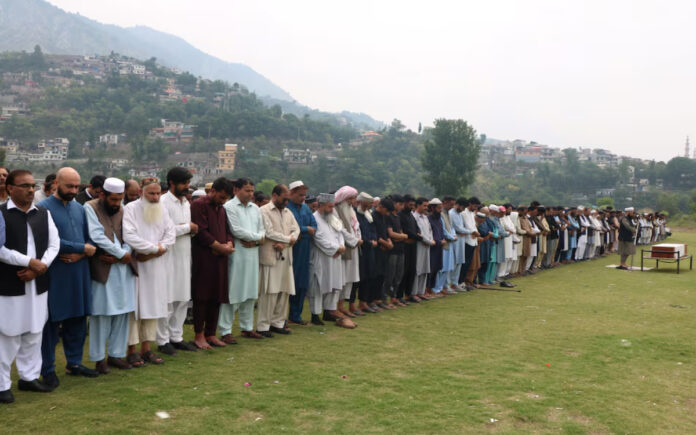Muridke, Pakistan: India launched precision strikes on Wednesday against what it described as the operational bases of two banned militant groups—Jaish-e-Mohammed (JeM) and Lashkar-e-Taiba (LeT)—located deep inside Pakistan’s heartland, escalating tensions between the nuclear-armed neighbors.
Video footage captured a bright explosion at a residential Islamic seminary on the outskirts of Bahawalpur in central Pakistan, believed to be linked to JeM. The strike was reportedly in retaliation for last month’s deadly attack in Indian-administered Kashmir, which killed 26 people, mostly tourists. The Indian government has blamed the incident on Pakistan-based Islamist militants.
The seminary had been largely evacuated ahead of the strike due to rising fears of an Indian response. However, according to JeM, the family of its founder, Masood Azhar, remained at the site. The Pakistani military reported that 13 people, including 10 of Azhar’s relatives—five of them children—were killed in the attack. Thousands attended the funerals later that day, held at a local stadium, chanting religious slogans such as “Allah Akbar”.
“(Indian Prime Minister Narendra) Modi’s brutality has broken all norms,” JeM said in a statement. “The grief and shock are indescribable.” The group confirmed the death of Azhar’s sister and her husband but did not respond to inquiries about why his family had not evacuated.
Masood Azhar, who has not been seen publicly for years, and his brother Abdul Rauf Asghar, reportedly did not attend the funeral prayers. The road leading to the seminary was blocked following the attack.
Shortly after midnight, further north in Muridke near Lahore, four Indian missiles struck a complex over a six-minute period, according to a local government official. The strike destroyed a mosque and an adjoining administrative building, killing three people. The rest of the campus remained intact.
While Pakistan identifies the site as a health and educational complex, India claims it is linked to LeT, the group accused of orchestrating the 2008 Mumbai attacks that killed over 160 people. Though banned, LeT has denied involvement in those attacks. Its leader, Hafiz Saeed, has been imprisoned in Pakistan since 2020 on terror financing charges. Saeed insists that his organization operates legally and runs educational institutions, hospitals, and social services with no links to militancy.
Indian officials described the strikes as “pinpoint operations” against what they claimed were nine terrorist training camps, two of which were the headquarters of JeM and LeT. “Over the last three decades Pakistan has systematically built terror infrastructure,” an Indian government spokesperson said during a briefing.
Pakistan, however, offered a starkly different account, stating that Indian jets targeted six sites and killed 26 “innocent civilians”, injuring 46 others. Islamabad strongly condemned the attacks and warned of retaliation, describing the strikes as the most significant Indian offensive on Pakistani territory in decades.
Also Read | Trump Offers to Help as India-Pakistan Conflict Intensifies
The conflict between India and Pakistan has long been centered on the disputed Kashmir region. However, the airstrikes on Bahawalpur and Muridke mark a serious shift, with India extending its military reach into densely populated areas of Pakistan.
India maintains that seven of its nine targets were directly associated with JeM and LeT, both of which are listed as terrorist organizations by the United Nations Security Council. It claims these groups run militant training camps and indoctrination centers within Pakistan and are responsible for launching attacks across the border.
Also Read | Ukraine Observes Unusual Calm as Kremlin-Imposed Ceasefire Takes Effect
Jaish-e-Mohammed insists that its operations within Pakistan are charitable and educational, and that its militant activities are solely focused on Indian-administered Kashmir. Pakistan, for its part, denies supporting any militant groups and accuses India of backing separatist elements within its own territory—allegations New Delhi has consistently denied.
As both nations exchange accusations and brace for potential escalation, international observers warn that the situation could deteriorate rapidly if diplomatic efforts to de-escalate fail.



